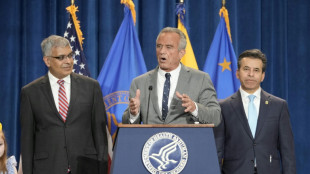
-
 Indian army says new exchange of gunfire with Pakistan
Indian army says new exchange of gunfire with Pakistan
-
Epstein accuser Virginia Giuffre takes own life in Australia: family

-
 Hundreds of buildings damaged, dozens injured in 6.3 Ecuador quake
Hundreds of buildings damaged, dozens injured in 6.3 Ecuador quake
-
India and Pakistan's Kashmir fallout hits economy too

-
 Francis's funeral to be grand farewell to 'pope of the poor'
Francis's funeral to be grand farewell to 'pope of the poor'
-
Pogacar faces defiant Evenepoel at Liege-Bastogne-Liege

-
 Chelsea eye great escape against Barcelona in Women's Champions League
Chelsea eye great escape against Barcelona in Women's Champions League
-
Iran, US to hold new round of high-level nuclear talks

-
 'Energy and effort' pay off for Reds as Blues' woes continue
'Energy and effort' pay off for Reds as Blues' woes continue
-
Albatross and closing birdie lift China's Liu to LPGA Chevron lead

-
 On the horizon? Wave of momentum for high seas treaty
On the horizon? Wave of momentum for high seas treaty
-
Developing countries should fast-track US trade deals: World Bank president

-
 Grizzlies' Morant 'doubtful' for must-win game 4 v Thunder
Grizzlies' Morant 'doubtful' for must-win game 4 v Thunder
-
Trump in Rome for pope funeral in first foreign trip of new term

-
 Trump says Russia-Ukraine deal 'very close' after new Kremlin talks
Trump says Russia-Ukraine deal 'very close' after new Kremlin talks
-
US rookies lead PGA pairs event with McIlroy and Lowry in hunt

-
 Trump tariff promises get a reality check
Trump tariff promises get a reality check
-
Warriors coach Kerr 'relatively optimistic' injured Butler will play game 3

-
 Postecoglou hopes 'Stonecutter's Credo' can inspire Spurs
Postecoglou hopes 'Stonecutter's Credo' can inspire Spurs
-
PSG lose unbeaten Ligue 1 record ahead of Arsenal showdown

-
 Venezuela accuses El Salvador president of 'human trafficking'
Venezuela accuses El Salvador president of 'human trafficking'
-
Own goal takes Sundowns to African final against Pyramids

-
 Scores of buildings damaged, 20 injured in Ecuador quake
Scores of buildings damaged, 20 injured in Ecuador quake
-
US stocks extend rally as market eyes busy calendar next week

-
 Pope's death triggers surge of disinformation he fought against
Pope's death triggers surge of disinformation he fought against
-
Rovanpera takes control of Rally Islas Canarias

-
 Zelensky insists Crimea is Ukrainian as US envoy meets Putin
Zelensky insists Crimea is Ukrainian as US envoy meets Putin
-
Patel and Mendis help Sunrisers beat Kings in Dhoni's 400th T20

-
 Copa del Rey ref statements 'unacceptable': Real Madrid after boycotting final build-up
Copa del Rey ref statements 'unacceptable': Real Madrid after boycotting final build-up
-
Insurance CEO's accused killer pleads not guilty to federal murder charges

-
 FBI arrests Wisconsin judge for shielding undocumented migrant
FBI arrests Wisconsin judge for shielding undocumented migrant
-
Brazil ex-president Collor de Mello jailed for corruption

-
 Zelensky insists Crimea 'belongs' to Ukraine as US envoy meets Putin
Zelensky insists Crimea 'belongs' to Ukraine as US envoy meets Putin
-
Real Madrid boycott Copa del Rey build-up over referee complaints

-
 Trinidad and Tobago votes for parliament, PM, with opposition in lead
Trinidad and Tobago votes for parliament, PM, with opposition in lead
-
IMF chief hails 'constructive' Spring Meetings held under tariff uncertainty

-
 Iran FM Araghchi in Oman ahead of nuclear talks with US
Iran FM Araghchi in Oman ahead of nuclear talks with US
-
Dozens of buildings destroyed, 20 injured in Ecuador quake

-
 Young Barca must 'enjoy' Real Madrid Copa final fight: Flick
Young Barca must 'enjoy' Real Madrid Copa final fight: Flick
-
Pakistan and India border closure separates families

-
 Brazil's Bolsonaro 'stable' after post-surgery setback
Brazil's Bolsonaro 'stable' after post-surgery setback
-
Catholics in secular Cuba hail Francis as 'bridge'

-
 US envoy Witkoff, Putin discuss 'possibility' of direct Russia-Ukraine talks
US envoy Witkoff, Putin discuss 'possibility' of direct Russia-Ukraine talks
-
Community seeks answers after French school knife killing

-
 German prosecutors seek jail terms in VW 'dieselgate' trial
German prosecutors seek jail terms in VW 'dieselgate' trial
-
Sabalenka makes winning start at Madrid Open

-
 EU, US should de-escalate and negotiate trade deal: IMF Europe director
EU, US should de-escalate and negotiate trade deal: IMF Europe director
-
Russia accuses Ukraine of killing general in car bombing

-
 Emery wants FA Cup glory and Champions League berth for Villa
Emery wants FA Cup glory and Champions League berth for Villa
-
Buildings destroyed, one injured in Ecuador quake


India's Nipah virus outbreak: what do we know so far?
Authorities in India are scrambling to contain a rare outbreak of Nipah, a virus spread from animals to humans that causes deadly fever with a high mortality rate.
Here is a look at what we know so far:
- What is the Nipah virus? -
The first Nipah outbreak was recorded in 1998 after the virus spread among pig farmers in Malaysia.
The virus is named after the village where it was discovered.
Outbreaks are rare but Nipah has been listed by the World Health Organization (WHO) -- alongside Ebola, Zika and Covid-19 -- as one of several diseases deserving of priority research for their potential to cause a global epidemic.
Nipah usually spreads to humans from animals or through contaminated food, but it can also be transmitted directly between people.
Fruit bats are the natural carriers of the virus and have been identified as the most likely cause of subsequent outbreaks.
Symptoms include intense fever, vomiting and a respiratory infection, but severe cases can involve seizures and brain inflammation that results in a coma.
There is no vaccine for Nipah.
Patients have a mortality rate of between 40 and 75 percent depending on the public health response to the virus, the WHO says.
- What has happened during previous outbreaks? -
The first Nipah outbreak killed more than 100 people in Malaysia and prompted the culling of one million pigs in an effort to contain the virus.
It also spread to Singapore, with 11 cases and one death among slaughterhouse workers who came into contact with pigs imported from Malaysia.
Since then, the disease has mainly been recorded in Bangladesh and India, with both countries reporting their first outbreaks in 2001.
Bangladesh has borne the brunt in recent years, with more than 100 people dying of Nipah since 2001.
Two early outbreaks in India killed more than 50 people before they were brought under control.
The southern state of Kerala has recorded two deaths from Nipah and four other confirmed cases since last month.
Authorities there have closed some schools and instituted mass testing.
This marks Kerala's fourth recorded spate of Nipah cases in five years. The virus killed 17 people during the first instance in 2018.
The state has managed to stamp out previous outbreaks within a matter of weeks through widespread testing and strict isolation of those in contact with patients.
- Are animal-to-human viruses becoming more frequent? -
Having first appeared thousands of years ago, zoonoses -- diseases that can be transmitted from animals to humans -- have multiplied over the past 20 to 30 years.
The growth of international travel has allowed them to spread more quickly.
By occupying increasingly large areas of the planet, experts say, humans also contribute to disruption of the ecosystem and increase the likelihood of random virus mutations that are transmissible to humans.
Industrial farming increases the risk of pathogens spreading between animals while deforestation heightens contact between wildlife, domestic animals and humans.
By mixing more, species will transmit their viruses more, which will promote the emergence of new diseases potentially transmissible to humans.
Climate change will push many animals to flee their ecosystems for more livable lands, a study published by the scientific journal Nature warned in 2022.
According to estimates published in the journal Science in 2018, there are 1.7 million unknown viruses in mammals and birds, 540,000-850,000 of them with the capacity to infect humans.
S.F.Warren--AMWN


